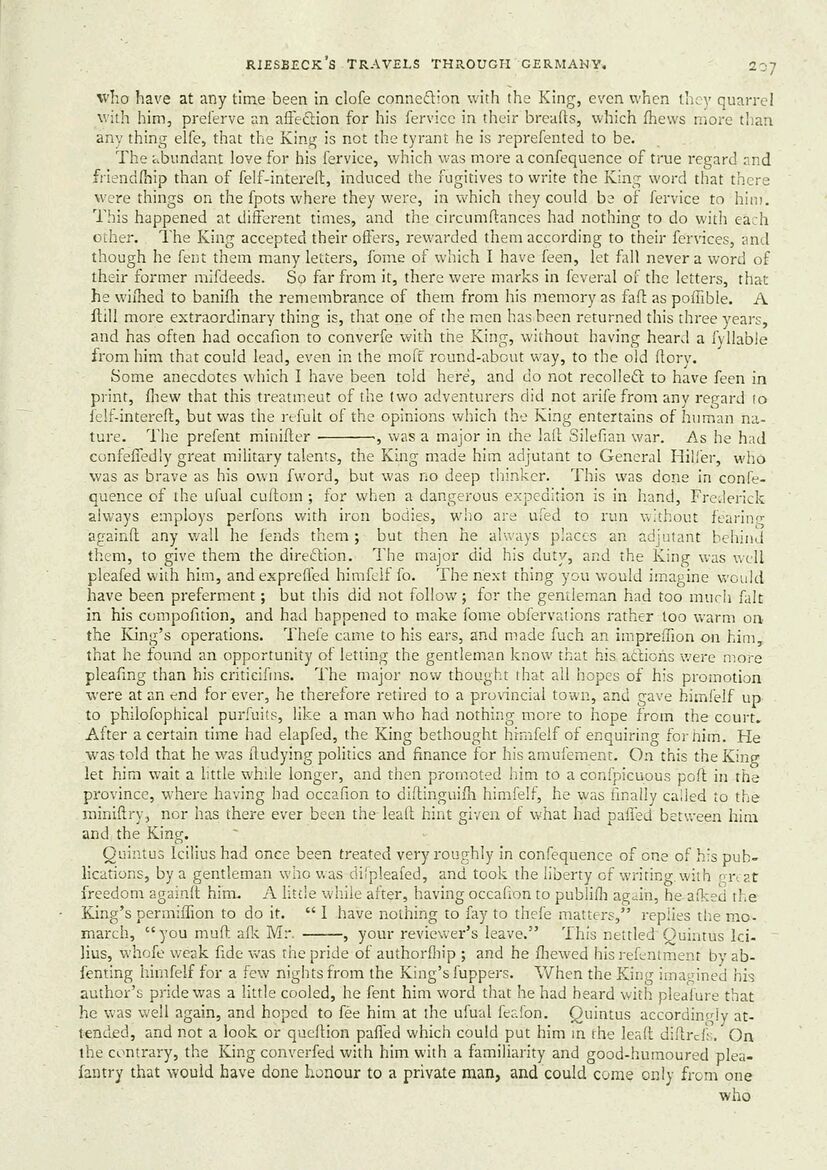
Full resolution (JPEG) - On this page / på denna sida - Pages ...

<< prev. page << föreg. sida << >> nästa sida >> next page >>
Below is the raw OCR text
from the above scanned image.
Do you see an error? Proofread the page now!
Här nedan syns maskintolkade texten från faksimilbilden ovan.
Ser du något fel? Korrekturläs sidan nu!
This page has never been proofread. / Denna sida har aldrig korrekturlästs.
RIESBECK’S TRAVELS THROUGH GERMANY, 207
who have at any time been in clofe connection with the King, even when they quarrel
with him, preferve an affection for his fervice in their breafts, which fhews more than
any thing elfe, that the King is not the tyrant he is reprefented to be. __
The abundant love for his fervice, which was more a confequence of true regard and
friendfhip than of felf-interelt, induced the fugitives to write the King word that there
were things on the fpots where they were, in which they could be of fervice to him.
This happened at different times, and the circumftances had nothing to do with each
other. The King accepted their offers, rewarded them according to their fervices, and
though he fent them many letters, fome of which I have feen, let fall never a word of
their former mifdeeds. So far from it, there were marks in feveral of the letters, that
he wifhed to banifh the remembrance of them from his memory as faft as poflible. A
ftill more extraordinary thing is, that one of the men hasbeen returned this three years,
and has often had occafion to converfe with the King, without having heard a fyllable
from him that could lead, even in the moft round-about way, to the old ftory.
Some anecdotes which I have been told here, and do not recolleét to have feen in
print, fhew that this treatmeut of the two adventurers did not arife from any regard to
{elf-intereft, but was the refult of the opinions which the King entertains of human na-
ture. The prefent minifter » was a major in the laft Silefian war. As he had
confefiedly great military talents, the King made him adjutant to General Hilfer, who
was as brave as his own fword, but was no deep thinker. This was done in confe-
quence of the ufual cuftom; for when a dangerous expedition is in hand, Frederick
always employs perfons with iron bodies, who are ufed to run without fearing
againft any wall he fends them;- but then he always places an adjutant behind
them, to give them the direction. The major did his duty, and the King was well
pleafed with him, and exprefled himfelf fo. The next thing you would imagine would
have been preferment ; but this did not follow; for the gentleman had too much falt
in his compofition, and had happened to make fome obfervations rather too warm on
the King’s operations. ‘Thefe came to his ears, and made fuch an impreffion on him,
that he found an opportunity of letting the gentleman know that his actions were more
pleafing than his criticifins. “The major now thought that all hopes of his promotion
were at an end for ever, he therefore retired to a provincial town, and gave himfelf up
to philofophical purfuits, like a man who had nothing more to hope from the court.
After a certain time had elapfed, the King bethought himfelf of enquiring forhim. He
was told that he was itudying politics and finance for hisamufement. On this the King
let him wait a little while longer, and then promoted him to a confpicuous poft in the
province, where having had oceafion to diftinguifh himfelf, he was finally cailed to the
miniftry, nor has there ever been the leaft hint given of what had paffed between him
and the King.
Quintus Icilius had once been treated very roughly in confequence of one of his pub-
lications, by a gentleman who was di/pleafed, and took the liberty of writing with creat
freedom again{t him. A little while after, having occafion to publifh again, he afked the
King’s permiffion to do it. ‘*I have nothing to fay to thefe matters,” replies the mo-
march, ‘you muft afk Mr. > your reviewer’s leave.” ‘This nettled Quintus Ici-
lius, whofe weak fide was the pride of authorfhip ; and he fhewed his refentment by ab-
fenting himfelf for a few nights from the King’s fuppers. When the King imagined his
author’s pride was a little cooled, he fent him word that he had heard with pleafure that
he was well again, and hoped to fee him at the ufual feafon. Quintus accordingly at-
tended, and not a look or queftion pafled which could put him in the leaft diftrefs. On
the contrary, the King converfed with him with a familiarity and good-humoured plea-
fantry that would have done honour to a private man, and could come only from one
who
<< prev. page << föreg. sida << >> nästa sida >> next page >>